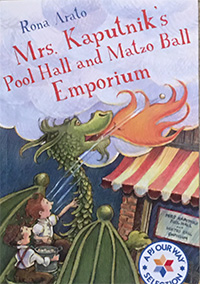

MORAGA, California — Visiting my family in this Contra County town, I happened across a book from the PJ Library titled Mrs. Kaputnik’s Pool Hall and Matzo Ball Emporium by Rona Arato. Now, I’m one of those fellows who will read anything put in front of him, including cereal boxes and milk cartons. This story book had a fire-breathing dragon on the cover, so I knew the story was fiction. But wherever did someone get a last name like Kaputnik, I couldn’t help but wonder.
Before I tell you the answer, I should first inform you that this is a story about a Russian Jewish family who immigrated to the United States in the early 20th century after finding a marvelous egg that hatched into a friendly and quite protective dragon. The father had preceded Mrs. Kaputnik to the United States but was nowhere to be found once they arrived. What little money the family had was snatched by the father’s brother, who in exchange gave them title to his dirty restaurant. With nowhere to go, Mrs. Kaputnik put her heart and soul into the restaurant, which eventually became famous as the home of the fire eating dragon, and matzo balls so hard they could be used to knock over stacks of tin cans, carnival style.
The rest of the story deals with the family’s adaptation to America, all the while hoping to be reunified with the missing father of the family.
Supposedly, the name Kaputnik was assigned to the family at Ellis Island, when Mrs. Kapustin (her real name) worried aloud that if the baby dragon they had smuggled into the U.S. were discovered they would be Kaput (finished). “Is that your name, Kaput?” a translator asked. “Nicht (No),” responded Mrs. Kapustin. And so the immigration inspector wrote down what he thought he heard — “Kaputnik.”
And if that legend seems far fetched, the U.S. Immigration Service will tell you so too are all the other stories of names being changed at Ellis Island. Many years ago, when my wife Nancy and I visited Ellis Island, we asked an official why they changed all those names.
The official all but pulled his hair out. “We didn’t change any names here!” he exclaimed. “That’s a myth.”
He said that people arrived in New York Harbor by ships, which had passenger manifests. When passengers came to Ellis Island for inspection, they were called by the names that were on the manifest. “This was a transit point,” said the official. “We didn’t change any names.” If names were changed, it happened before or after Ellis Island, but not there.
It’s possible that agents in Europe changed family names, especially if they were hard of hearing or had difficulty spelling. It is also possible that the families “Americanized” their names after arriving in the U.S., as my own family did — changing the name from Harowitz to Harrison. But Ellis Island officials claim their predecessors had nothing to do with it.
As one who enjoys tracing family roots, I’ve seen passenger lists for ships arriving in New York and other entry ports of the United States, so I’m inclined to believe the official at Ellis Island, which now is operated as an immigration museum.
But I still enjoy the stories about supposed name changes at Ellis Island. They’re part of American Jewish cultural mythology.
*
Donald H. Harrison is editor of San Diego Jewish World. He may be contacted via donald.harrison@sdjewishworld.com
It’s a lovely story and very funny. But as your conversation with the Immigration official indicated, there was no name changing at Ellis Island. There’s a similar story about a Jewish man with the name Ferguson. When asked how he got his name he said he was so nervous going through the lines at Ellis Island when that asked him for his name he was so flustered he said “Fergessen!” Wonderful example of Jewish humor, but not immigration history.